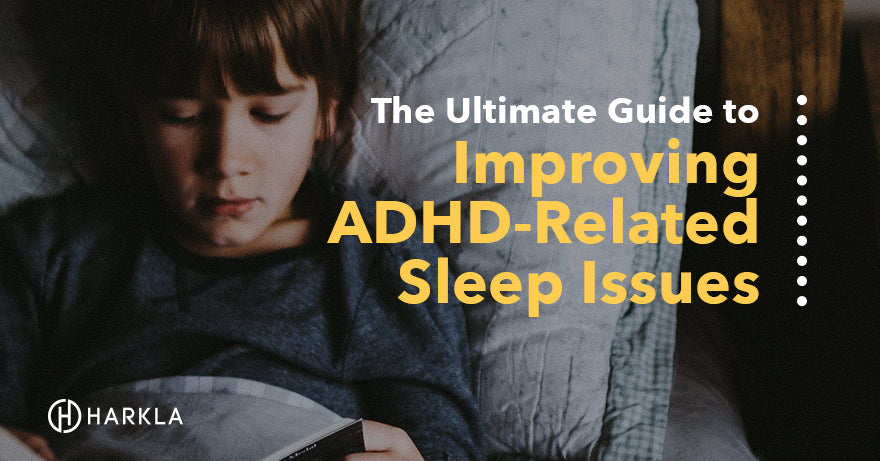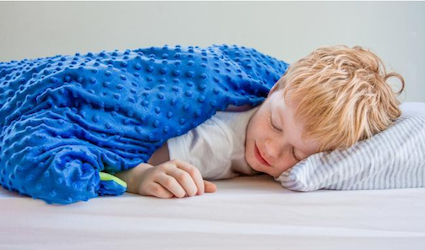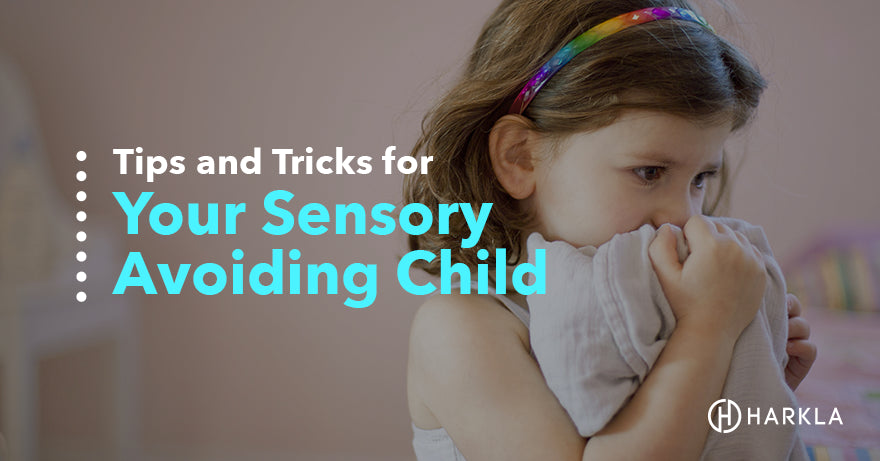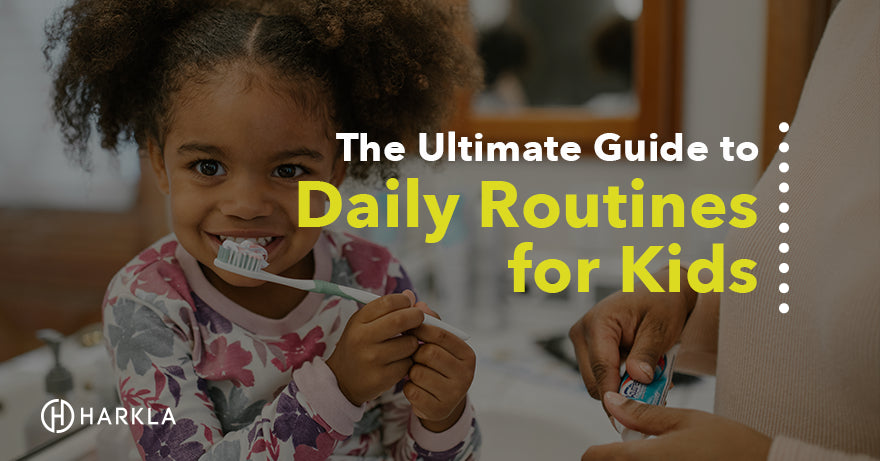Your Cart is Empty

You know those painful mornings when you roll out of bed after a restless night’s sleep? Maybe you were stressed out from work, up all night with a sick child, or worrying about the endless possibilities of life. If you’ve ever gone without your daily dose of REM sleep, chances are likely that you felt irritable, drowsy, or a bit disorganized the next day.
Did you know that these symptoms of sleep deprivation can mimic those of ADHD?
As with Autism, ADHD can go hand-in-hand with sleep issues. Not only children, but adults with ADHD can struggle to turn off their minds and fall asleep. And oftentimes, that sleep ends up being restless.
In the article below, we discuss the different sleep issues those with ADHD face, as well as 10 ways to help improve sleep with ADHD.
Between 6% and 10% of the population has a diagnosis of ADHD. Typically, this diagnosis is made during early childhood.
Some common characteristics of childhood ADHD may include trouble maintaining focus on activities, trouble following directions and listening, trouble sitting still or fidgeting, displaying excess amounts of energy, interrupting others or blurting out, difficulty with organization, becoming distracted easily, being impatient, and frequently forgetting things or losing items.
In adulthood, it is typical for hyperactivity to decrease, however, problems with attention, disorganization, and impulsivity often remain. Adults with ADHD often have difficulty fully completing tasks or have trouble focusing at work.
One of the major problems that children and adults with ADHD both have to deal with is sleep disorders.
Mood changes, daytime sleepiness, difficulty concentrating, poor planning, and disorganization are all symptoms of sleep deprivation...and ADHD!
When you add sleep issues to ADHD, the effects are compounded. The JAMA Network reports that “up to 50% of parents of children with ADHD report difficulties with their children’s sleep.”¹
The National Resource Center on ADHD reports these sleep disturbances to be two to three times more likely in kids with ADHD than kids without².
There are several types of issues with sleep experienced by those with ADHD. Some people might display one characteristic, while others might experience all issues described.
The first, most common issue is initiating sleep. People with ADHD often present with high energy levels and this can make it difficult to initiate sleep at bedtime. For many families, this can often lead to power struggles and, in turn, behavioral issues associated with bedtime.
Another common sleep issue is difficulty maintaining sleep. People with ADHD often awaken during the night, which is highly disruptive to sleep.
There are several potential causes of this including:
Due to the previously mentioned issues, many people with ADHD also have difficulty waking in the morning. Often, waking a child with ADHD becomes a difficult task.
Children with this issue often experience periods of daytime sleepiness or fatigue, in addition to periods of intense hyperactivity or impulsivity.
Finally, there may be difficulty with consistent sleeping. For example, they may get 8 hours of sleep one evening and 6 the next evening. Again, inconsistent sleep patterns can have an impact on overall behavior, attention, and feelings of fatigue during the daytime.
There are several ways to assist with the sleep-related issues that people with ADHD experience. Many of these strategies can be implemented into a daily routine, while others require consultation with your doctor or pediatrician.
Below is a helpful list of ten potential strategies to address sleep-related issues.
Most children, in general, require guidance when it comes to maintaining a consistent bedtime routine, but even adults don't typically have a regular routine they follow. Children with ADHD might need additional assistance, due to distractibility and inattention.
A consistent routine will help trigger the brain to relax and prepare for sleep, which can assist with initiating and maintaining sleep for these children.
An example of a good sleep routine might include completing hygiene tasks, putting on pajamas, engaging in a calming or wind-down activity, and then bedtime.
If you like tea, maybe having a cup of calming tea like chamomile or kava, an hour or two before getting ready for bed, would help as well.
As discussed above, routine and consistency are both important when it comes to addressing sleep-related issues. This should include a consistent time for going to sleep.
It is recommended to keep bedtime within a half-hour time period each night. For example, setting bedtime between 9 and 9:30 PM each night.
This gives some room for flexibility but maintains the routine, which is critical.
Calming strategies are helpful ways to assist your body and mind with settling before bed.
Each adult and child will have their own unique needs and strategies that work best for them. Some might include taking a bath or shower, reading a book or magazine, listening to calming music, etc.
It should be noted that activities that involve screen time, such as phone use or watching tv should be stopped at least two hours before bed. The blue light emitted from screens can actually trigger the brain to stay awake, which can only make sleep problems worse, especially for those with ADHD.
For those with ADHD, it is essential that they have sufficient time during the day to expend any additional energy, whether that is playing with friends for kids, or working out for adults.
This will assist with falling and staying asleep.
For children, a sensory diet may be beneficial. This is a term used to describe a prescribed list of activities, completed at certain times of the day, to assist with helping your child meet their unique sensory needs. An occupational therapist can help you further explore this option.
However, you can also assist your child in getting enough activity during the day, to assist with energy expenditure. Simple activities such as running, playing sports, going on a walk, and doing jumping jacks are great ways to encourage movement throughout the day.
Exercise or active activities should be completed three hours before bedtime to ensure sufficient time for the body to calm down.
If possible, drinks or food with high caffeine amounts should be avoided for children with ADHD, especially in the evenings.
For adults, giving up caffeine may be something you don't want to do, so the best option is to not have any caffeine after 2 pm. It typically takes about 8 hours for caffeine to work its way out of your body. So while you may not feel caffeinated, you may still struggle to sleep if caffeine hasn't worked it's way out yet.
Caffeine activates our brain centers, which is the opposite of what needs to occur to ensure healthy sleep.

A weighted blanket can be an effective way to help those with ADHD fall asleep and stay asleep. A weighted blanket provides extra input or weight to your child’s body. This additional weight stimulates the muscles, which signals the brain to release calming hormones. These hormones are responsible for helping us sleep.
We wrote an article collecting all of the science behind weighted blankets for ADHD showing how it can help improve sleep.
Check out our weighted blankets here.
Like our weighted blankets, we have a sensory compression sheet that offers deep touch pressure but without the weight. It's like a giant, soft, compression "sock" that you pull onto the bed.
The choice between a weighted blanket and a compression sheet depends on your child and their preferences.
To ensure proper sleep, having an environment that is set up to promote healthy sleep is extremely important.
There are some environmental modifications that can be made to assist with better sleep. This might include darkening the room with room darkening shades, using a white noise machine or a sound machine, ensuring the temperature is between 68 and 71 degrees Fahrenheit during the evening, etc.
You may need to experiment with these options to figure out what works best, as everyone has different preferences.
People with ADHD often struggle with organizing tasks. Therefore, it is important to have an organizational system or to help your child develop some type of organizational system, to ensure that important tasks, such as homework or gathering lunch money or other supplies for the next day, are completed before the nighttime routine starts.
This helps ensure that the mind can focus on unwinding and preparing for sleep, other than worrying about the tasks needing to be completed for the next day.
A simple checklist with visuals can assist your child in implementing a routine and remembering to complete important tasks.
Many people with ADHD respond well to cues in their environment. It might be helpful to set some type of alarm each evening, indicating it is time to begin the nighttime routine.
Repeated use of an alarm can help the brain adapt better to the routine.
In addition, it may be useful to set an alarm in your child’s room, 10-15 minutes before they need to get out of bed to begin their morning routine. Again, this is a helpful cue for your child and can help them self-initiate their routine.
If you’ve tried these strategies and they haven’t been successful, it is best to discuss options with your doctor or child's pediatrician.
One of the most common sleep aids is melatonin.
Melatonin is a hormone that is naturally produced by the pineal gland during the sleep cycle and it has been used to treat sleep disturbances in kids with ADHD.
A study in the 2007 Journal of American Academy of Child & Adolescent Psychiatry researched the effects of Melatonin in the treatment of insomnia in children with ADHD and found that circadian rhythms, natural melatonin production, and total sleep time were all improved³.
The 2009 Journal of Pineal Research reports that long-term melatonin treatment was effective in 88% of cases and no safety concerns were found for continuing melatonin treatment⁴.
As with all over-the-counter medications, you want to ensure the correct dosage.
Because some people with ADHD are also on stimulant medications, finding the right dose of Melatonin can be a tricky task so it’s best to work with your pediatrician to consider all of the variables that are specific to your child.
Those with ADHD often struggle with sleep-related issues. There are several simple, routine-based strategies that can assist with these issues.
It is our hope that this article highlighted some solutions that you can start implementing today to ensure a more healthy and restful sleep.
Leave us a comment or share on Facebook if you found this helpful or have any follow-up questions!
References
“Sleep Problems in Children With Attention-Deficit/Hyperactivity Disorder | Attention Deficit/Hyperactivity Disorders | JAMA Pediatrics | The JAMA Network.” Jamanetwork.com, 2017, http://jamanetwork.com/journals/jamapediatrics/fullarticle/379359
“The Functional Impact of Sleep Disorders in Children With ADHD - Jan 16, 2017 .” Journals.sagepub.com, 2017, http://journals.sagepub.com/doi/abs/10.1177/1087054716685840
“Long-Term Follow-up of Melatonin Treatment in Children with ADHD and Chronic Sleep Onset Insomnia - Hoebert - 2009 - Journal of Pineal Research - Wiley Online Library.” Onlinelibrary.wiley.com, 2017, http://onlinelibrary.wiley.com/doi/10.1111/j.1600-079X.2009.00681.x/full.
Foitzik, K., & Brown, T. (2018). Relationship between sensory processing and sleep in typically developing children.American Journal of Occupational Therapy, 72,1-9.
Spruyt, K., & Gozal, D. (2011). Sleep disturbances in children with attention-deficit/hyperactivity disorder. Expert Reviews on Neurotherapy, 11(4), 565-577.
Kolar, D., Keller, A., Golfinopolous, M., Cumyn, L., Syer, C., & Hechtman, L. (2008). Treatment of adults with attention-deficit hyperactivity disorder.Neuropsychiatric Disorder Treatment, 4(2), 389-403.where can i find “sleep”light bulbs
Thanks for the article. I would also point out to readers that findings from studies indicate that lower iron levels can be a contributing factor for both ADHD and sleep problems for some children. Parents should look at the ferritin s level in their children’s lab results and discuss it with their doctors, including a board certified pediatric sleep medicine specialist who is likely to be more knowledgeable about the issue.
Try ADHD Lullaby to help your kid sleep. It works for my kid.
Comments will be approved before showing up.



Nicole from Harkla
October 16, 2024
Hi Rhonda! Amazon has options for sleep light bulbs. Just type “Sleep light bulbs” in the search bar. :-)